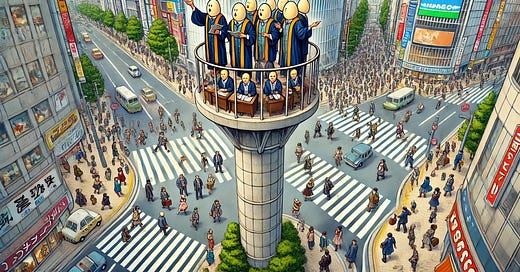Academia is now an Industry Association
Loss of bipartisan trust in expertise and its traditional homes shouldn't be surprising, but yet apparently it is.
I want to highlight this comment again:
“(…) lack of viewpoint diversity unnecessarily exposes academia to this 'we cannot admit defeat' (political) phenomena, and thus degrades the quality and reliability of research outputs or academic consensus.”
———
Academia (at least in North America) has long been highly unrepresentative of societies’ political viewpoint diversity1, which creates huge blind spots in academic output and academic consensuses that lack rigor2.
For the rest of us who aren’t attuned to the developments in higher-ed (who could blame you), increasing polarization has exposed this reality. In part by more aggressively drawing academics into the ‘culture wars’ and forcing them to ‘pick a side’, polarization has laid bare academia’s lack of viewpoint diversity for all to see. When the dust settled, all their stakes were planted on one political ‘side’.
When this happens, academia becomes just another advocacy group, albeit one that can wave the flag of (ever-diminishing) scientific legitimacy. When a supermajority3 of academics’s4 views are of the same political camp, with substantial internal social pressure to boot5, social science is only at greater risk of exposure to the ever-present biases and corruptions of its fallible creators (us).
And in this situation, you cannot expect academia’s findings to be treated any differently than those of an industry association. Just like you would be right to be skeptical of studies released by an industry association because, well, it’s members clearly have similar stances and incentives, people are growing skeptical of academic studies for the same reasons.
To recap: we have a group of people asking the questions, making the hypotheses, getting the research grants, collecting the data, finding the conclusions, etc. etc. If a vast majority of them are asking similar questions, holding similar hypotheses, etc. etc., the study is at greater risk of exposure to the kinds of biases social science work is inherently subjected to. Even a dismissive look at the evidence collected by the likes of Professor Lee Jussim should be able to see this.
Until this is admitted and recognized as an issue by academia itself, it will continue to undermine trust in these once bipartisan/nonpartisan institutions (for lack of a better description). This recognition will be hard. For the majority in academia, it will feel like “admitting defeat” (although it most certainly isn’t defeat - we all win by recognizing what went wrong).
Polarization makes it even harder, because unfortunately those who have been loudest on recognizing this issue have generally been non-leftists: conservatives, centrists and classical liberals. That’s unfortunate because admitting your opponents have a point - that’s hard. But it’s what we’re left with in polarized times, where the last of our nonpartisan institutions are helplessly undercut by perhaps human nature’s greatest weakness: tribalism.
Am I asking too much? Well I don’t think society should be asking anything else if we hope to recover from this mess.6
I swear this podcast mentioned a shift leftwards going back to the 1960’s social movements, but on a second skim through I can’t find that mention… Otherwise this study claims it started in the 1990s
See Heterodox Academy and affiliated scholars for research on this.
See Lee Jussim’s work for the exact data.
Most specifically in social sciences.
In this environment, some questions are simply off the table.
Compounding this issue (a topic for another essay), is that political parties and media organizations fighting for clicks and votes both win in some ways from increased polarization. Arguably so do most social media platforms, including Substack. In the long-run, however, no one wins.





